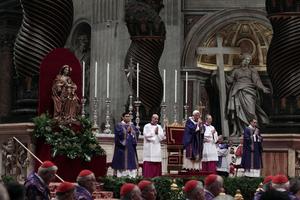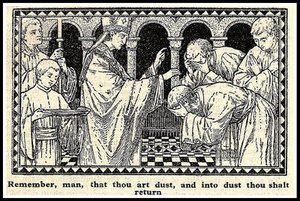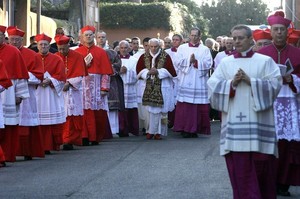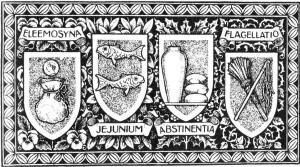 Ash Wednesday the first day of Lent. On this day, the observance of fast and abstinence begins. Pope St. Leo teaches that the main purpose for fasting is not that the body be deprived of food, but that the mind at the same time be withdrawn from wickedness, we should endeavor during Lent, not only to be temperate in eating and drinking, but especially to lead a modest life, sanctifying the days by persevering prayer and devoutly attending the Church’s liturgy.
Ash Wednesday the first day of Lent. On this day, the observance of fast and abstinence begins. Pope St. Leo teaches that the main purpose for fasting is not that the body be deprived of food, but that the mind at the same time be withdrawn from wickedness, we should endeavor during Lent, not only to be temperate in eating and drinking, but especially to lead a modest life, sanctifying the days by persevering prayer and devoutly attending the Church’s liturgy.
Tag: Ash Wednesday
Ash Wednesday
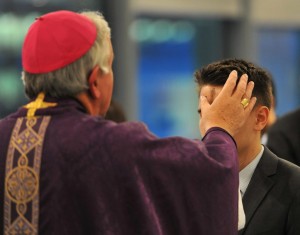 For 40 days we enter into a period of fasting and prayer just as the Lord did in the wilderness, facing the Evil One, in preparation for his public ministry. The hallmarks, to be effective, have to sting a little. Prayer, fasting and the act of almsgiving ought to be intensified since these things are done throughout the year. That is, I need to be personally involved in lenten practices and we ought to feel the sacrifice of time, the intellect, and the will. The journey of faith is none other than fighting with sin and accepting the sovereignty of God in and over our life. We call this a journey for a precise reason: we are never finished turning our life with the help of grace to the Author of Life. In time it is hoped, that our measure is replaced by Christ’s, the influence of the powers-that-be is changed to the influence of the Messiah. Lent is the yearly reminder that heaven is our goal, the joy of new life is given to us because this is God’s desire for us. Zero-in on the Lord’s Passion and receive the gift of resurrection. Pope Francis said today in Rome,
For 40 days we enter into a period of fasting and prayer just as the Lord did in the wilderness, facing the Evil One, in preparation for his public ministry. The hallmarks, to be effective, have to sting a little. Prayer, fasting and the act of almsgiving ought to be intensified since these things are done throughout the year. That is, I need to be personally involved in lenten practices and we ought to feel the sacrifice of time, the intellect, and the will. The journey of faith is none other than fighting with sin and accepting the sovereignty of God in and over our life. We call this a journey for a precise reason: we are never finished turning our life with the help of grace to the Author of Life. In time it is hoped, that our measure is replaced by Christ’s, the influence of the powers-that-be is changed to the influence of the Messiah. Lent is the yearly reminder that heaven is our goal, the joy of new life is given to us because this is God’s desire for us. Zero-in on the Lord’s Passion and receive the gift of resurrection. Pope Francis said today in Rome,
Ash Wednesday, begins our Lenten journey of penance, prayer and conversion in preparation for the Church’s annual celebration of the saving mysteries of Christ’s passion, death and resurrection. In these days the Church asks us to ponder with joy and gratitude God’s immense love revealed in the paschal mystery and to live ever more fully the new life we have received in Baptism. This journey of spiritual renewal in the footsteps of Christ also calls us to acknowledge and respond to the growing spiritual and material poverty in our midst. Specifically, it means consciously resisting the pressure of a culture which thinks it can do without God, where parents no longer teach their children to pray, where violence, poverty and social decay are taken for granted. May this Lent, then, be a time when, as individuals and communities, we heed the words of the Gospel, reflect on the mysteries of our faith, practice acts of penance and charity, and open our hearts ever more fully to God’s grace and to the needs of our brothers and sisters.
Since I like the Church Fathers, it seems that St. Maximus the Confessor has something to say to us:
God’s will is to save us, and nothing pleases him more than our coming back to him with true repentance. The heralds of truth and the ministers of divine grace have told us this from the beginning, repeating it in every age. Indeed, God’s desire for our salvation is the primary and preeminent sign of his infinite goodness, and it was precisely in order to show that there is nothing closer to God’s heart that the divine Word of God the Father, with untold condescension, lived among us in the flesh, and that he died, suffered, and said all that was necessary to reconcile us to God.
The wisdom of trusted Fathers of the Church s helpful:
The life of a monk [actually, use Christian] ought to be a continuous Lent. Since few, however, have the strength for this, we urge the entire community during these days of Lent to keep its manner of life most pure and to wash away in this holy season the negligences of other times. This we can do in a fitting manner by refusing to indulge evil habits and by devoting ourselves to prayer with tears, to reading, to compunction of heart and self-denial. During these days, therefore, we will add to the usual measure of our service something by way of private prayer and abstinence from food or drink, so that each of us will have something above the assigned measure to offer God of his own will with the joy of the Holy Spirit. In other words, let each one deny himself some food, drink, sleep, needless talking and idle jesting, and look forward to holy Easter with joy and spiritual longing. (Rule of St. Benedict)
God Recycles — Happy Ash Wednesday!
Benedict XVI’s homily for Ash Wednesday: “return to God with all our heart,” and you will be new people
Today, Ash Wednesday, we begin a new Lenten journey, a journey that extends over forty days and leads us towards the joy of Easter, to victory of Life over death. Following the ancient Roman tradition of Lenten stations, we are gathered for the celebration of the Holy Eucharist. The tradition says that the first statio took place in the Basilica of Saint Sabina on the Aventine Hill. Circumstances suggested we gather in Saint Peter’s Basilica. Tonight there are many of us gathered around the tomb of the Apostle Peter, to also ask him to pray for the path of the Church going forward at this particular moment in time, to renew our faith in the Supreme Pastor, Christ the Lord. For me it is also a good opportunity to thank everyone, especially the faithful of the Diocese of Rome, as I prepare to conclude the Petrine ministry, and I ask you for a special remembrance in your prayer.
Ash Wednesday
Ash Wednesday is a day of fasting (required for those between the ages of 18-59; encouraged for all others) and a day of abstinence from meat (for all aged 14 and up) it is NOT a holy day of obligation. There is no obligation to receive ashes.
What does fasting mean?
Fasting means partaking of only one full meal for the day. Two smaller meals may substitute in order not to weaken. No eating between meals.
What does abstinence mean?
The practice of abstinence is defined as not eating red meat; eggs and milk products are acceptable.
Blessed John Paul II reminded us that “While preserving their value, external penitential practices are never an end in themselves, but an aid to inner penitence, which consists of freeing the heart from the grip of sin with the help of grace, to direct it toward the love of God and our brothers and sisters.“
Lenten practices: confession of sins, praying the Stations of the Cross, giving alms, doing an act of charity. Prayer, fasting, and almsgiving form one unit, to separate them makes the whole thing incoherent. Many people attend Mass more often than once a week.
“For the sake of the joy which lay before him he endured the cross, heedless of its shame” (Hebrews 12-2).
Lent’s a time to be converted because we need a new heart
At the ancient
Roman Basilica of Santa Sabina known today as the mother church of the Order of
Preachers, the Pope began Lent with the reception of ashes. The imposition of ashes is not ritualistic sign without meaning: we put ashes on our heads not in contradiction of the Gospel chosen for that day but as a way to remind ourselves that an outward sign conveys an inward reality. He first began the Lenten prayer at the
Benedictine Church of Sant’Anselmo (just down the street from Santa Sabina).
There he gathered with the monks, priests, bishops , cardinals and laity for a
visit to the Blessed Sacrament, brief service of prayer and a procession to
Santa Sabina where Holy Mass was celebrated. Yes, the pope walks the streets of Rome, but in a limited way. It is a gesture full of beauty. This is ancient way for the Roman
Pontiff to lead the Church into a season of penance and preparation for the
sacred Triduum. The Holy Father’s homily is below.
We begin today the
liturgical season of Lent with the thought-provoking rite of the imposition of
ashes, through which we wish to take on the commitment to convert our hearts to
the horizons of grace. In general, in common opinion, this time runs the risk
of being marked by sadness, by the darkness of life. Instead, it is a precious
gift of God; it is an intense time full of meanings in the journey of the
Church; it is the itinerary to the Lord’s Easter. The biblical readings of
today’s celebration give us indications to live this spiritual experience
fully.
Continue reading Lent’s a time to be converted because we need a new heart
Fast and abstinence for Ash Wednesday
The Church’s norms for the Lenten Fast and Abstinence us is as follows:
- Catholics between the ages of 18 and 59 who are in good health are bound by the obligation to fast on Ash Wednesday and Good Friday.
- Catholics between the ages of 14 and older must abstain from meat on Ash Wednesday, Good Friday and all Fridays of Lent.

